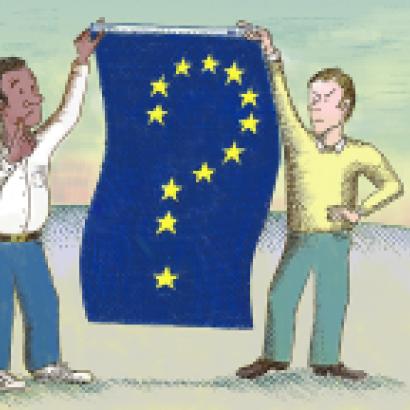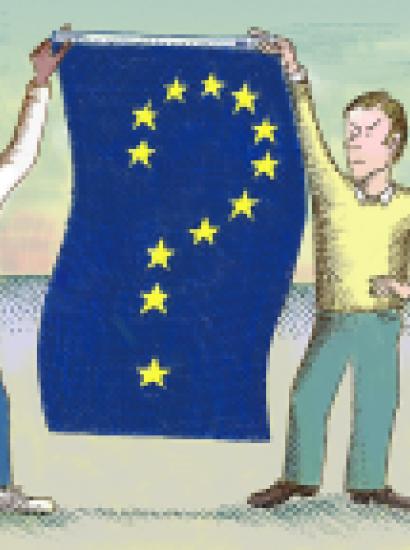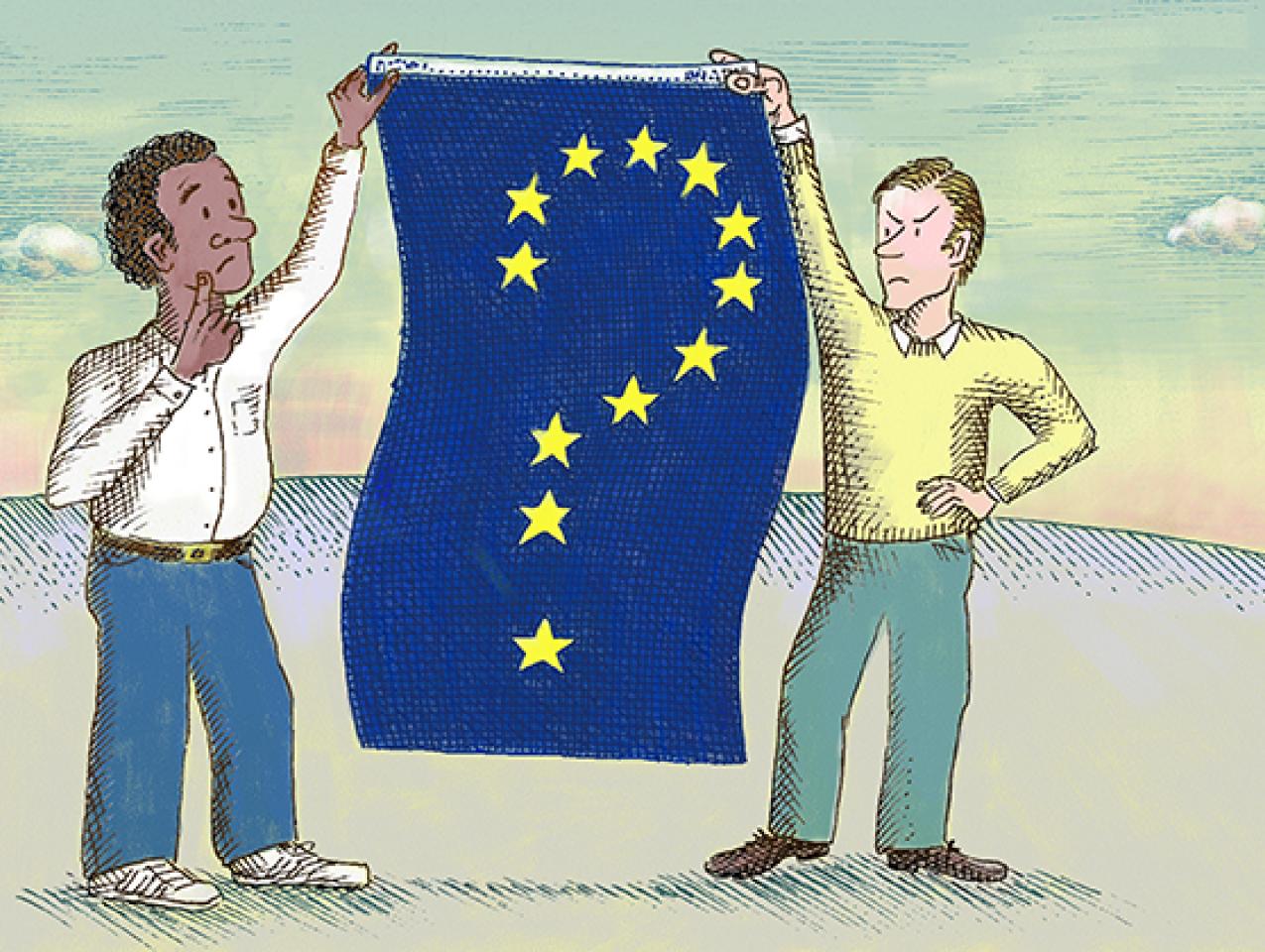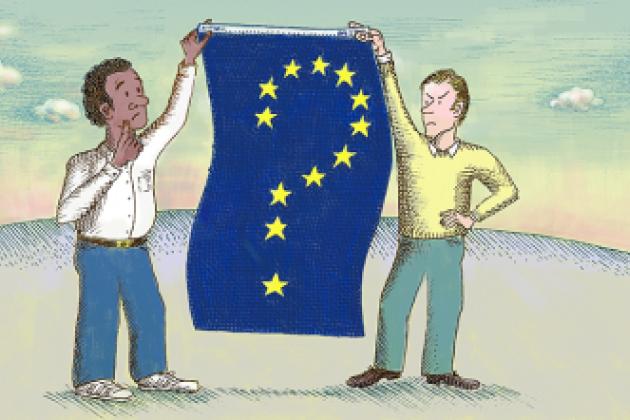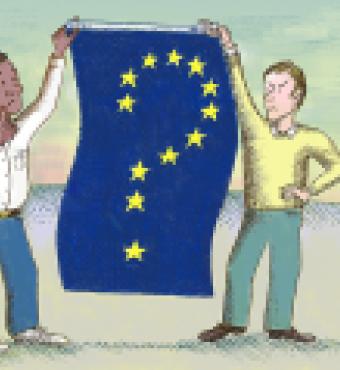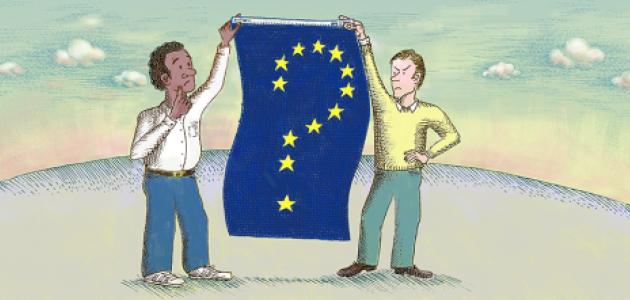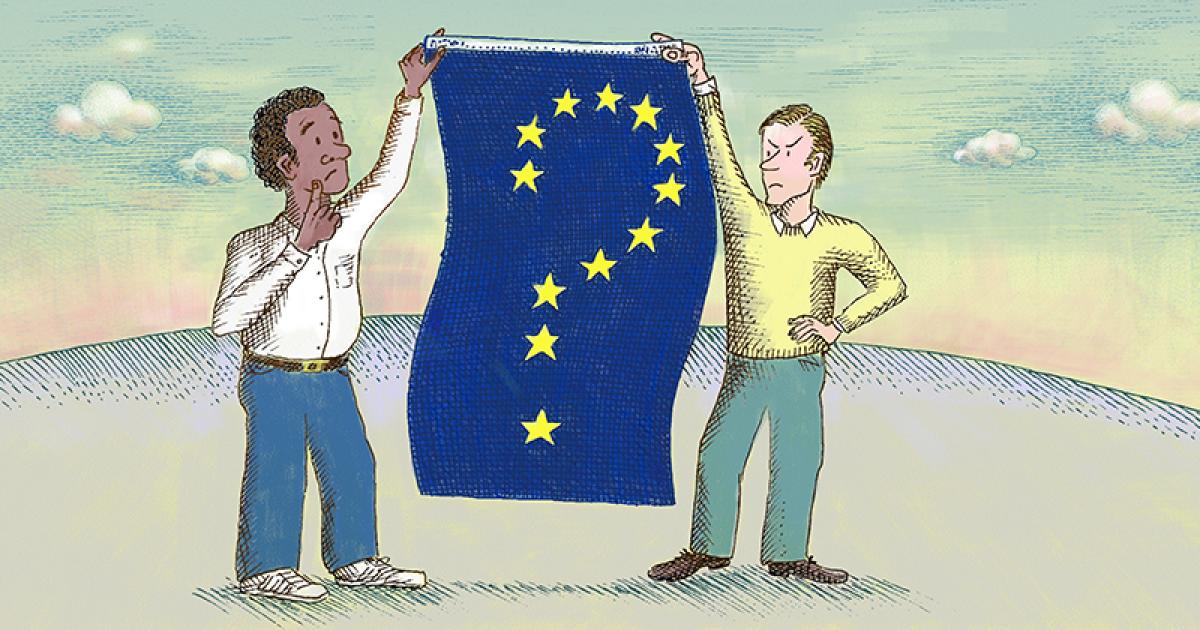The European Union has long excited American progressives, who want the United States to model itself after the European body. As each year passes, it has become difficult to understand this admiration. These days the E.U. acts more and more like a bloated bureaucracy staffed with elites armed with intrusive regulatory power and insulated from citizen accountability. The success of Euroskeptic parties in this spring’s European Parliament elections casts doubt on the whole E.U. project.
The electoral victories of nationalist and populist parties in Britain, France, Austria, Denmark, and the Netherlands reveal the chronic dissatisfaction with the E.U., which has grown worse in light of the sluggish economic growth, high unemployment, painful austerity measures, and morally hazardous bailouts that have beset the continent. More troubling for many are the E.U.’s intrusions into national sovereignty, like its increased oversight over national budgets, the Fiscal Compact Treaty that subjects nations to fiscal discipline, and moves to create a banking union with a common supervisor and mechanism for dissolving failed banks. Given these discontents, public trust in E.U. institutions has reached all-time lows.
To add insult to injury, the E.U. Parliament recently named Jean-Claude Junker as European Commissioner. Junker has long been a champion of increased centralization. Selecting the commissioner has traditionally been a privilege reserved for the Council of Ministers, the 28 heads of government that guard the sovereignty and interests of the member states. As the Financial Times reported, this “crude institutional power grab by the parliament,” ignoring as it did the strong anti-E.U. protest vote in many member nations, “is an affront to democratic accountability.”
Those who champion reforming the E.U. are well intentioned, but their reforms could never go far enough. The problem with the E.U. is that it was, at its founding, grounded in false assumptions about human nature and the role of the nation in creating a people’s identity. These assumptions have for 200 years been accepted as facts, when actually they are questionable ideas challenged by history.
The E.U. is just the latest example of the powerful Enlightenment idea that human nature and civilization, through the expansion of scientific knowledge, are progressing away from the cruelty, oppression, and collective violence created by irrational superstition, religion, and ethnic or nationalist loyalties. Once liberated from this destructive ignorance, people can create political and social orders that will promote peace, social justice, political freedom, and prosperity. Most important will be what Immanuel Kant, in his influential 1795 essay “Perpetual Peace,” called a “federation of free states” that would form a “pacific alliance . . . different from a treaty of peace, . . . inasmuch as it would forever terminate all wars.” Kant predicated the possibility of such global peace on “the uniformity of the progress of the human mind.” A universal human nature progressively becoming more rational and possessing more knowledge about itself and the world can craft a global order that would lessen if not eliminate the evils that had afflicted the human race for all of its previous history.
In the nineteenth century, transnational treaties, conventions, and institutions were created to realize the dream “of establishing and securing international peace by placing it upon a foundation of international understanding, international appreciation, and international cooperation,” as Nicholas Murray Butler, president of the Carnegie Endowment for International Peace, wrote in 1932. The Geneva Conventions, the Hague Conventions, and the establishment of an international Court of Arbitration had all reflected this ideal. The Preamble to the First Hague Convention in 1899 sounded the Kantian note in it goal to ensure the “maintenance of the general peace” and the “friendly settlement of international disputes,” based on the “solidarity which unites the member of the society of civilized nations” and their shared desire for “extending the empire of law, and of strengthening the appreciation of international justice.”
The assumption behind such internationalism was that the national and ethnic differences underlying people’s collective identities were not as important as the new universal, transnational identity created by the expansion of scientific knowledge, globalized trade, and globe-shrinking technologies such as the steamship, railroad, telegraph, and telephone. More important, this belief in a unified human identity assumed that all people everywhere desired the same things as Westerners––political freedom, human rights like equality, and prosperity. The other aims that peoples historically have more often pursued––obedience to their gods, exclusionary ethnic or tribal loyalty, land and resources violently appropriated from others, unequal social hierarchies and roles, revenge for injuries or dishonor inflicted by others––were deemed remnants of our barbaric past soon to be left behind by the progress of the human mind and the improvement in peoples’ material and political circumstances.
The unprecedented carnage of World War I, in which the peoples of highly civilized Europe killed each other with nationalist and ethnic fervor, did not lessen enthusiasm for such idealistic internationalism. In the two decades between the wars, the League of Nations, which called for collective security, disarmament, and the resolution of conflict through arbitration; the 1926 Locarno Treaty, in which “France and England Ban War Forever,” as the New York Times headline put it; and the 1928 Kellogg-Briand Pact, which condemned “recourse to war” and enjoined all settlement of disputes to be sought only by “pacific means,” all included the future Axis aggressors among the signatories and participants. Nor did the even greater horrors of World War II disabuse the West of its idealism, most obviously manifested in the creation of the United Nations, which has done little to save the some 41 million victims of invasion, genocide, civil war, political murder, and ethnic cleansing since World War II.
This record of failure would not have surprised political theorists from Thucydides to the American framers. In that tradition, human nature is permanently flawed by what James Madison called “passions and interests” that necessarily conflict with those of other people or nations, and often lead to violence between them. For example, John Adams in his Defense of the Constitutions of the United States in 1787 wrote, “Though we allow benevolence and generous affections to exist in the human breast, yet every moral theorist will admit the selfish passions in the generality of men to be the strongest. There are few who love the public better than themselves, though all may have some affection for the public . . . Self-interest, private avidity, ambition, and avarice, will exist in every state of society, and under every form of government.” Nor did these realists believe that better education or prosperity could permanently rein in these flaws of human nature, for dangerous world of “imperious necessities,” as Thucydides called the tragic contingencies of human existence, would always create stresses that prove “a rough master that brings most men’s characters to a level with their fortunes.” The gruesome carnage Europeans inflicted on each other in the twentieth century proved Thucydides correct.
Equally suspect is the assumption that national identity should be weakened and marginalized because it is irrationally exclusionary and parochial, and as such incites zero-sum conflicts between peoples. Particularly after World War II, the evils wrought by fascism and Nazism supposedly proved that nationalism is inherently bellicose and thus hinders the spread of universal human rights, tolerance, and the rational adjudication of disputes, all of which would eventually result in global peace and prosperity. This tarring of nationalism with the brush of fascism and Nazism was one of the mechanisms for selling the transnational European Union and the weakening of national sovereignty it required.
But this assault on national identity was not just historically dubious, but blind to the role the nation-state played in creating the collective identity and solidarity that made liberal democracy possible. For as French political philosopher Pierre Manent has emphasized, “The sovereign state and representative government are the two great artifices that have allowed us to accommodate huge masses of human beings within an order of civilization and liberty.” Shared language, history, mores, folkways, cultures, values, political virtues, and landscapes give people––bound as they are to a particular, concrete place and time in which they pass their daily lives––the foundations of their shared existence that transcend their individual differences. To quote Manent again, “If our nation suddenly disappeared and its bonds were dispersed, each of us immediately would become a stranger, a monster, to himself.” Without those complex “ties that bind,” a people cease being a coherent political community, and become instead a congeries of fragmented, discrete groups with irreconcilable interests and aims.
The tiny elite of cosmopolitan, globetrotting writers, journalists, professors, businessmen, and Eurocrats may live in a postmodern, post-national world, but the mass of ordinary Europeans do not. This stubborn nationalist sentiment becomes vocal at times of crisis, such as during the financial meltdown in 2009, when hardworking, thrifty Germans protested bailing out indolent wastrel Greeks, and the Greeks in turn evoked the brutal German occupation of their country during World War II as justification for demanding that Germany rescue their broken government.
Moreover, Europeans still have to live with neighbors who are passionate about their nationalism, none more so than Russia. The EU “postmodern” foreign policy based on “supranational constraints on unilateral policies and the progressive development of community norms,” as Oxford’s Kalypso Nicolaides puts it, has so far been impotent in the face of Vladimir Putin’s irredentist ambitions in Ukraine and elsewhere. Russia’s annexation of Crimea and continuing violence and subversion in eastern Ukraine have dismissed the economic sanctions and diplomatic warnings that are no match for the Russians’ wounded national pride.
The growing strength of frankly nationalist, Euroskeptic political parties, evident in their success in the recent European Parliament elections, testifies to the continuing hold national identity has on millions of Europeans. Given the conflicting “passions and interests” of human nature, this disparaged and disregarded nationalism is unlikely to remain content with sporadic protest-votes or flag-waving during soccer championships. How it will manifest itself in the future––through peaceful political change, or through violent reaction––is still an open question. But there is no question that the E.U. has little for the U.S. to emulate, and much to avoid.








